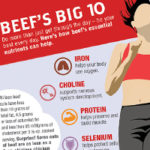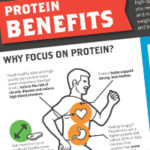Assorted resources & links.
 Beef’s Big 10
Beef’s Big 10
Do more than just get through the day – be your best every day. Here’s how beef’s essential nutrients can help.
 Protein Benefits
Protein Benefits
Beef gives your body more of the high-quality protein you need to achieve and maintain a healthy weight, and preserve and build muscle.
 30-Day Protein Challenge
30-Day Protein Challenge
The 30 Day Protein Challenge is a fun, step-by-step way to help you get an optimal amount of protein throughout your day.
>> Right-click each JPG to save/share.
or
Links below are to .png logo files with transparent backgrounds. Click to open/view or right-click to save as…
You can copy/paste the items at right for use in your social media.
Prevent Type 2 Diabetes — A research review, “The Underappreciated Role of Muscle in Health and Disease,” published in the American Journal of Clinical Nutrition indicated that increasing daily high-quality protein intake may optimize muscle strength and metabolism, and ultimately improve overall health. A growing body of evidence suggests muscle metabolism may also play a role in the prevention of many chronic diseases, such as type 2 diabetes.
Bone Health/Osteoporosis — Calcium isn’t the only nutrient important for bone health. Bones also need enough protein to reach their peak performance. A study confirmed that adults between the ages of 50 and 69 who ate more protein-rich foods, such as beef, demonstrate the importance of dietary protein for optimal bone health, which can have a significant impact on overall health and independence.
Add Vitamin B to your Anti-Alzheimer’s Arsenal — Adults anemia and cognitive more, research found that people consuming more than 22.4 milligrams of niacin, or to suffer from Alzheimer’s disease and age-related cognitive decline.
There are 29 cuts of beef that met government guidelines for “lean” with less than 10 grams of total fat, 4.5 grams or less of saturated fat, and less than 95 milligrams of cholesterol per 3-ounce serving. Surprisingly half the fatty acids in lean beef are monounsaturated, the same heart-healthy type found in olive oil. Lean beef delivers high-quality protein in a nutrient-rich, low caloric package, and is a delicious addition to any meal.
Lean beef is an excellent source of high-quality protein. In addition to protein, one 3-ounce serving of lean beef provides an excellent or good source of nine other key.
Keep Weight In Check – Many adults do not get enough protein in their diet because they are restricting calories in an effort to manage weight. However, eating lean protein is essential for maintaining lean body mass, which helps promote an active or healthy metabolism. Making dietary changes such as adding high-quality protein can ultimately lead to improved weight protein promotes satiety, eating a protein-rich meal or snack helps you feel full longer, and satisfies hunger.
Heme vs. Nonheme Iron – Lean meats contain heme iron, which is much more easily absorbed by the body than nonheme iron found in plant foods. Heme iron is an important dietary component for promoting cognitive health, including memory, ability to learn and reasoning. Heme iron is particularly beneficial for growing children because research indicates that some toddlers are at higher risk for iron deficiency, and childhood and “meat factor,”beef helps the body absorb nonheme iron. Unlike plant proteins, beef is the food supply’s most easily absorbed source of iron. In addition, beef is an excellent source of readily available zinc.The absorption of zinc from beef is about four times greater than that from a high-fiber breakfast cereal. As with iron, including meat in your diet also improves the absorption of zinc from other foods.
The Caloric Cost of Plant Protein